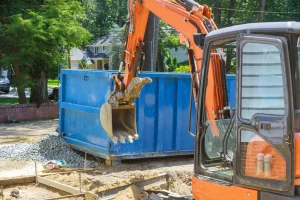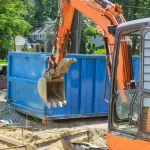Landfills have long been a cornerstone of waste management systems across the globe, providing a place where society’s refuse can be isolated from daily life. While they offer a practical solution for dealing with the vast amounts of waste generated, the use of different types of landfills comes with a complex set of advantages and disadvantages that directly impact both the environment and public health. Understanding these pros and cons is essential for evaluating landfill use and exploring other waste management strategies.
Traditionally, landfills have been seen as a relatively quick and economical method to manage waste, offering an immediate place to dispose of materials that cannot be reused or recycled. In terms of benefits, they can alleviate the spread of waste in urban areas and are equipped to handle a variety of waste types. However, the environmental and health impacts they carry, such as potential soil and water contamination from leachate, and the release of methane—a potent greenhouse gas—into the atmosphere, raise concerns about their long-term sustainability. Operational considerations also play a role in how effectively landfills are managed, influencing their overall impact.
 In managing a landfill, it’s crucial that you understand the complexities of waste management techniques, adhere strictly to landfill design and maintenance best practices, and stay informed of technological advancements that can improve operations.
In managing a landfill, it’s crucial that you understand the complexities of waste management techniques, adhere strictly to landfill design and maintenance best practices, and stay informed of technological advancements that can improve operations.
 When considering the role of landfills in managing solid waste, both the pros and cons are significant. Pros include the managed collection of waste in a specific location for disposal, which helps to keep cities clean. Landfills also offer potential energy production through the capture of methane, a byproduct that can be converted to energy. This approach to waste management is especially critical given the increasing population and consumption patterns.
However, the downsides of landfills cannot be overlooked. The environmental impact of these waste management systems is profound. They contribute to climate change through greenhouse gas emissions and lead to leachate formation which can cause soil and groundwater contamination. The presence of landfills might also lead to eutrophication in nearby water bodies, upsetting aquatic ecosystems.
Additionally, landfills like Fresh Kills were once the largest in the world, demonstrating both the vast capacity such sites offer and the massive environmental impact they have when they exceed their limits. Moreover, issues like noise, bugs, and foul odors can affect nearby communities.
In summary, you should be aware that landfills carry both advantages, like job creation and efficient waste management, and disadvantages, such as negative effects on the local environment and health. Decisions around the use and management of landfills should balance these considerations, taking into account the immediate benefits and the long-term environmental impact.
When considering the role of landfills in managing solid waste, both the pros and cons are significant. Pros include the managed collection of waste in a specific location for disposal, which helps to keep cities clean. Landfills also offer potential energy production through the capture of methane, a byproduct that can be converted to energy. This approach to waste management is especially critical given the increasing population and consumption patterns.
However, the downsides of landfills cannot be overlooked. The environmental impact of these waste management systems is profound. They contribute to climate change through greenhouse gas emissions and lead to leachate formation which can cause soil and groundwater contamination. The presence of landfills might also lead to eutrophication in nearby water bodies, upsetting aquatic ecosystems.
Additionally, landfills like Fresh Kills were once the largest in the world, demonstrating both the vast capacity such sites offer and the massive environmental impact they have when they exceed their limits. Moreover, issues like noise, bugs, and foul odors can affect nearby communities.
In summary, you should be aware that landfills carry both advantages, like job creation and efficient waste management, and disadvantages, such as negative effects on the local environment and health. Decisions around the use and management of landfills should balance these considerations, taking into account the immediate benefits and the long-term environmental impact.
Key Takeaways
- Landfills provide a practical waste management option but have significant environmental and health implications.
- The benefits of landfills include keeping urban areas clean and managing diverse waste, but they may lead to pollution and greenhouse gas emissions.
- Efficient operations can mitigate some landfill downsides, yet exploring alternative waste management methods is crucial for sustainability.
Advantages of Landfills
Landfills are not just waste disposal sites; they offer significant economic benefits, generate energy, and contribute to resource management. Understanding these advantages positions you to appreciate the multifaceted role landfills play in waste management.Economic Impacts
Landfills contribute to your local economy by providing job opportunities. The operation and management of landfills require a workforce for daily activities, thus creating various roles from site managers to equipment operators. In addition to employment, landfills offer economic benefits by potentially lowering municipal waste management costs due to the reduced need for long-distance waste transportation.Energy Production
Your landfill has the potential to convert waste into energy production. As organic material decomposes, it produces methane, a potent greenhouse gas that can be harnessed as a source of renewable energy. This methane production can be captured to generate electricity or heat, reducing our reliance on fossil fuels and contributing to a more sustainable future.Resource Management
After a landfill reaches its capacity, the opportunity for land reclamation projects arises. These projects can transform former waste sites into public spaces, such as parks or golf courses, enabling you to see waste spaces repurposed. Through careful planning and management, the space that was once a landfill contributes back to the community, demonstrating effective resource management. By examining these aspects, you can see that landfills play a critical role beyond waste storage, impacting your economy, energy sector, and community resources.Environmental and Health Impacts
When you consider the environmental and health impacts of landfills, you’re looking at a range of issues, primarily the release of greenhouse gas emissions, the potential for water and soil pollution, and the effects on wildlife and their habitats.Greenhouse Gas Emissions
Landfills are notable for their production of methane gas, a potent greenhouse gas that contributes significantly to climate change. Methane is generated when organic waste decomposes anaerobically (without oxygen). The EPA states that landfills are the third-largest source of methane emissions in the United States. These emissions exacerbate global warming and can contribute to more extreme weather conditions.Water and Soil Pollution
Your local landfill can have a substantial impact on nearby soil and water quality. Leachate, a contaminated liquid, can seep out of landfills and carry toxins into the groundwater, which is a critical issue for surrounding ecosystems and human health. The degradation of soil texture and composition due to infiltration of heavy metals and other pollutants can lead to reduced soil fertility and increased risks of soil erosion.Wildlife and Habitat Effects
The presence of landfills can lead to the deforestation and displacement of local wildlife, which in turn affects biodiversity. Birds and animals are often attracted to landfills for food, exposing them to hazardous waste and health risks associated with the consumption of garbage and contact with toxic chemicals. Additionally, the alteration of landscapes and creation of landfill sites can destroy natural habitats, leading to long-term ecological imbalance.Operational Considerations
 In managing a landfill, it’s crucial that you understand the complexities of waste management techniques, adhere strictly to landfill design and maintenance best practices, and stay informed of technological advancements that can improve operations.
In managing a landfill, it’s crucial that you understand the complexities of waste management techniques, adhere strictly to landfill design and maintenance best practices, and stay informed of technological advancements that can improve operations.
Waste Management Techniques
You need a tailored approach to waste disposal, one that maximizes the life of your landfill while minimizing environmental impact. Regularly ordering the layers of waste and covering them with soil can significantly reduce the risk of pests and odors. Additionally, integrating composting as a part of your waste management system can divert organic waste, turning it into valuable compost that benefits environmental initiatives.- Daily Operations:
- Layer waste
- Apply cover soil
- Monitor and divert compostable waste
Landfill Design and Maintenance
Your landfill’s design is a key factor in preventing leaks and ensuring containment. Properly engineered bases and lining systems are non-negotiable to safeguard against groundwater contamination. Regular maintenance of these systems is essential for long-term operational success, and you must ensure that any leaks are promptly detected and addressed.- Key Design Elements:
- Basal lining
- Leachate collection systems
- Gas collection systems
Technological Advancements
Embrace new technology to enhance your landfill’s efficiency. Waste management systems now often include sophisticated software to track waste input and compaction rates, while innovations in bioreactor landfills have made rapid decomposition of waste possible. Keeping pace with these advancements positions your landfill as a leader in sustainable waste disposal.- Innovative Tech:
- Waste tracking software
- Compaction tech
- Bioreactor systems
Alternatives to Landfills
Exploring sustainable alternatives to landfills is crucial for effective waste management that conserves resources and minimizes environmental impact. You have the power to contribute to a healthier planet by considering these options.Recycling and Composting
Recycling provides a method to repurpose materials, reducing the need for new resources. For instance, aluminum cans and glass bottles can be recycled multiple times without losing purity or quality. This process conserves energy and raw materials, and Beyond Landfills discusses how these actions can mitigate the problems associated with landfill use. On the other hand, composting is an eco-friendly way to handle organic waste. By composting your food scraps and yard waste, you convert what would otherwise be methane-producing garbage into a nutrient-rich soil amendment, which can improve soil health and reduce the reliance on chemical fertilizers.Innovations in Waste Reduction
Waste-to-Energy Incineration is an innovation where waste is used as an energy source. Incinerators convert waste into electricity or heat, and while it’s a form of disposal, it can be considered a sustainable alternative as it generates energy and reduces waste volume significantly. However, it’s important to consider the emissions and ensure they are within safe limits. Sustainable recycling initiatives are constantly being developed, focusing on resource conservation and environmental protection. These can include programs for electronic waste, textiles, and plastics, which are often challenging to recycle. By participating in such initiatives, you support a more circular economy where products and materials are kept in use for as long as possible.Conclusion
 When considering the role of landfills in managing solid waste, both the pros and cons are significant. Pros include the managed collection of waste in a specific location for disposal, which helps to keep cities clean. Landfills also offer potential energy production through the capture of methane, a byproduct that can be converted to energy. This approach to waste management is especially critical given the increasing population and consumption patterns.
However, the downsides of landfills cannot be overlooked. The environmental impact of these waste management systems is profound. They contribute to climate change through greenhouse gas emissions and lead to leachate formation which can cause soil and groundwater contamination. The presence of landfills might also lead to eutrophication in nearby water bodies, upsetting aquatic ecosystems.
Additionally, landfills like Fresh Kills were once the largest in the world, demonstrating both the vast capacity such sites offer and the massive environmental impact they have when they exceed their limits. Moreover, issues like noise, bugs, and foul odors can affect nearby communities.
In summary, you should be aware that landfills carry both advantages, like job creation and efficient waste management, and disadvantages, such as negative effects on the local environment and health. Decisions around the use and management of landfills should balance these considerations, taking into account the immediate benefits and the long-term environmental impact.
When considering the role of landfills in managing solid waste, both the pros and cons are significant. Pros include the managed collection of waste in a specific location for disposal, which helps to keep cities clean. Landfills also offer potential energy production through the capture of methane, a byproduct that can be converted to energy. This approach to waste management is especially critical given the increasing population and consumption patterns.
However, the downsides of landfills cannot be overlooked. The environmental impact of these waste management systems is profound. They contribute to climate change through greenhouse gas emissions and lead to leachate formation which can cause soil and groundwater contamination. The presence of landfills might also lead to eutrophication in nearby water bodies, upsetting aquatic ecosystems.
Additionally, landfills like Fresh Kills were once the largest in the world, demonstrating both the vast capacity such sites offer and the massive environmental impact they have when they exceed their limits. Moreover, issues like noise, bugs, and foul odors can affect nearby communities.
In summary, you should be aware that landfills carry both advantages, like job creation and efficient waste management, and disadvantages, such as negative effects on the local environment and health. Decisions around the use and management of landfills should balance these considerations, taking into account the immediate benefits and the long-term environmental impact.
Frequently Asked Questions
This section addresses both the benefits and drawbacks of landfills, their health implications, and environmental impacts.What are the main disadvantages of using landfills for waste management?
Landfills can lead to significant soil and water pollution as hazardous chemicals and toxins may leach into the environment. There are also concerns about the emission of methane, a potent greenhouse gas, and the decrease in adjacent land values.How do landfills positively impact waste management?
They provide a way to contain waste in a single location and can reduce the transportation of waste. Landfills can also offer job opportunities and can be reused for other purposes after closure.In what ways can landfills affect human health?
Exposure to landfills can result in health problems due to odors, smoke, and potential water supply contamination. Proximity to landfills is also linked to increased risks of respiratory ailments and other health concerns.What is the environmental impact of landfills compared to incineration?
Landfills typically have lower greenhouse gas emissions than incineration and avoid air pollutants and the production of fly ash waste that can arise from burning trash.What are some benefits of sanitary landfills over open dumps?
Sanitary landfills are managed with environmental protection systems to minimize leachate and gas emissions, while open dumps lack such controls and are prone to cause soil and water pollution.How do landfills contribute to negative environmental effects?
Landfills can lead to the production of greenhouse gases, the destruction of natural habitats, and could foster conditions that harm wildlife, besides contributing to unpleasant odors and visual blight in surrounding areas.RECENT BLOGS

Date: March 06, 2025

Date: March 05, 2025

Date: February 26, 2025
Our Reviews
LATEST BLOGS








